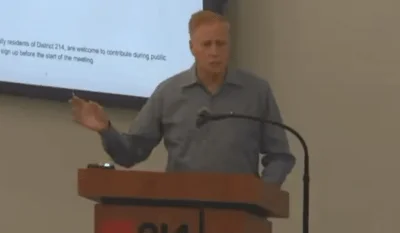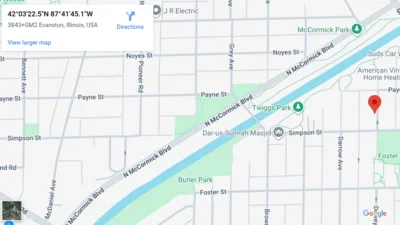Michelle Mussman, Illinois State Representative from the 56th District | https://www.facebook.com/RepMussman
Michelle Mussman, Illinois State Representative from the 56th District | https://www.facebook.com/RepMussman
According to the Illinois General Assembly site, the legislature summarized the bill's official text as follows: "Amends the Children with Disabilities Article of the School Code. Provides that, by no later than the beginning of a student's third year of high school or by the student's 16th birthday, whichever occurs first, the transition planning process must include a consideration of whether the student is a candidate for graduation. Requires this process to involve discussions with the student's individualized education program team, including the parent and the student. Provides that the discussions must address the implications of graduating with a regular diploma, particularly how it affects the student's right to receive a free appropriate public education (FAPE). Effective immediately."
The following is our breakdown, based on the actual bill text, and may include interpretation to clarify its provisions.
In essence, this bill amends the School Code to enhance transition services for children with disabilities, focusing on improving their academic and functional achievements to facilitate movement from school to post-school activities, such as further education, employment, and independent living. It requires that individualized education programs (IEPs) for students aged 14 1/2 include measurable goals and necessary transition services. Information on career and technical education opportunities, dual credit courses, and assistive technology must be provided. Transition planning is to be part of the IEP process, involving discussions about graduation and eligibility for a free appropriate public education. The bill mandates the inclusion of external entities in transition planning when appropriate and requires annual summaries of eligible students' transition goals and services to be submitted to local Transition Planning Committees. The act takes effect upon becoming law.
Michelle Mussman has proposed another six bills since the beginning of the 104th session.
Mussman graduated from the University of Cincinnati with a BS.
Michelle Mussman is currently serving in the Illinois State House, representing the state's 56th House District. She replaced previous state representative Paul Froehlich in 2011.
Bills in Illinois follow a multi-step legislative process, beginning with introduction in either the House or Senate, followed by committee review, floor debates, and votes in both chambers before reaching the governor for approval or veto. The General Assembly operates on a biennial schedule, and while typically thousands of bills are introduced each session, only a fraction successfully pass through the process to become law.
You can read more about bills and other measures here.
| Bill Number | Date Introduced | Short Description |
|---|---|---|
| HB2537 | 02/04/2025 | Amends the Children with Disabilities Article of the School Code. Provides that, by no later than the beginning of a student's third year of high school or by the student's 16th birthday, whichever occurs first, the transition planning process must include a consideration of whether the student is a candidate for graduation. Requires this process to involve discussions with the student's individualized education program team, including the parent and the student. Provides that the discussions must address the implications of graduating with a regular diploma, particularly how it affects the student's right to receive a free appropriate public education (FAPE). Effective immediately. |
| HB1862 | 01/29/2025 | Amends the Department of Human Services Act. Provides that unless otherwise required by State law or federal requirements, a service provider shall not be subject to a matching funds requirement in order to be eligible to receive funds from the Department for the Emergency and Transitional Housing Program or the Supportive Housing Program. Provides that, when making funding determinations, the Department of Human services retains discretion to take into consideration the ability of a service provider to leverage other funding sources, as well as other factors that may demonstrate fiscal solvency of the service provider and that the service provider is not solely reliant on State funds for the provision of services. Effective immediately. |
| HB1863 | 01/29/2025 | Creates the One Health Framework Task Force Act. Establishes the One Health Framework Task Force in the Department of Public Health for the purpose of developing a strategic plan to promote interdisciplinary communication and collaboration between physicians, veterinarians, and other scientific professionals and State agencies, with the goal of promoting the health and well-being of the State's residents, animals, and environment. Declares goals and responsibilities of the Task Force. Provides that the Task Force shall partner with or consult with certain entities in the State. Lists the members of the Task Force. Provides that the Task Force shall convene and meet at the call of the chairperson. Provides that the Department of Public Health shall provide support to the Task Force. Provides that members of the Task Force shall serve without compensation but shall be reimbursed for reasonable and necessary expenses from funds appropriated for that purpose. Provides that the Task Force shall submit a final report to the General Assembly and the Governor on or before January 1, 2027. Defines terms. |
| HB1869 | 01/29/2025 | Amends the Regional Superintendent of Schools Article of the School Code. Allows the State Superintendent of Education to designate a regional office of education or intermediate service center as a learning partner in any iteration of the statewide system of support so that services are provided to schools that are identified for school improvement under (i) the accountability system and (ii) the definition for Targeted, Comprehensive, or Intensive. Provides that the status of learning partner may be revoked at the State Superintendent's sole discretion. Effective July 1, 2025. |
| HB1783 | 01/27/2025 | Creates the Language Equality Acquisition for the Deaf, Hard of Hearing, and Deaf-Blind Children Act. Provides that the State Board of Education, in cooperation with the Deaf and Hard of Hearing Commission and the Department of Human Services, shall establish a language assessment program for deaf, hard of hearing, and deaf-blind children, and select language developmental milestones. Sets forth provisions concerning the scope and purpose of the program and the development of a resource for use by parents and guardians. Provides that the State Board, in cooperation with the Deaf and Hard of Hearing Commission and the Department of Human Services, shall select tools or assessments for educators that can be used to assess the language and literacy development of all deaf, hard of hearing, and deaf-blind children. Sets forth provisions concerning the tools or assessments. Provides that beginning on July 1, 2026, a language assessment shall be given to each child who is deaf, hard of hearing, or deaf-blind and who is less than 6 years of age. Sets forth provisions concerning the assessment. Provides that an advisory committee on language assessment programs shall be established by the State Board, the Deaf and Hard of Hearing Commission, and the Department of Human Services. Sets forth the membership and duties of the advisory committee. Provides that on or before July 1, 2026, the State Board, the Deaf and Hard of Hearing Commission, and the Department of Human Services shall publish a joint action plan and may propose legislation and rules necessary to implement the recommendations of the advisory committee. Sets forth provisions concerning reporting and rulemaking. Effective immediately. |
| HB1755 | 01/24/2025 | Repeals the Senior Citizens and Persons with Disabilities Property Tax Relief Act and removes all cross-references to the Act in various statutes. Amends the Illinois Act on the Aging. Requires the Department on Aging to implement and administer the Benefits Access Program and to establish the eligibility criteria under the program for: (1) the Secretary of State with respect to reduced fees paid by qualified vehicle owners under the Illinois Vehicle Code; (2) special districts that offer free fixed route public transportation services for qualified older adults under the Local Mass Transit District Act, the Metropolitan Transit Authority Act, and the Regional Transportation Authority Act; and (3) special districts that offer transit services for qualified individuals with disabilities under the Local Mass Transit District Act, the Metropolitan Transit Authority Act, and the Regional Transportation Authority Act. Sets forth household income eligibility limits and other eligibility requirements under the program. Authorizes the Department to adopt rules concerning automatic renewals and appeal rights under the program. Makes corresponding changes concerning the program to the Metropolitan Transit Authority Act, the Local Mass Transit District Act, the Regional Transportation Authority Act, the Illinois Public Aid Code, the Older Adult Services Act, and the Illinois Vehicle Code. Further amends the Illinois Act on the Aging by removing a requirement that the Department: (i) study the feasibility of implementing an affirmative action employment plan for the recruitment, hiring, and training of persons 60 years of age or older; and (ii) develop a multilingual pamphlet to assist physicians, pharmacists, and patients in monitoring prescriptions provided by various physicians and to aid persons 65 years of age or older in complying with directions for proper use of pharmaceutical prescriptions. Adds a requirement that the Department implement the Older Americans Act. Removes provisions requiring a Community Care Program Medicaid Initiative and a Community Care Program Medicaid Enrollment Oversight Subcommittee. Makes other changes. |
| HB1645 | 01/23/2025 | Amends the Illinois Pesticide Act. Bans the sale and use of ester formulations of 2,4-dichlorophenoxyacetic acid. |






 Alerts Sign-up
Alerts Sign-up